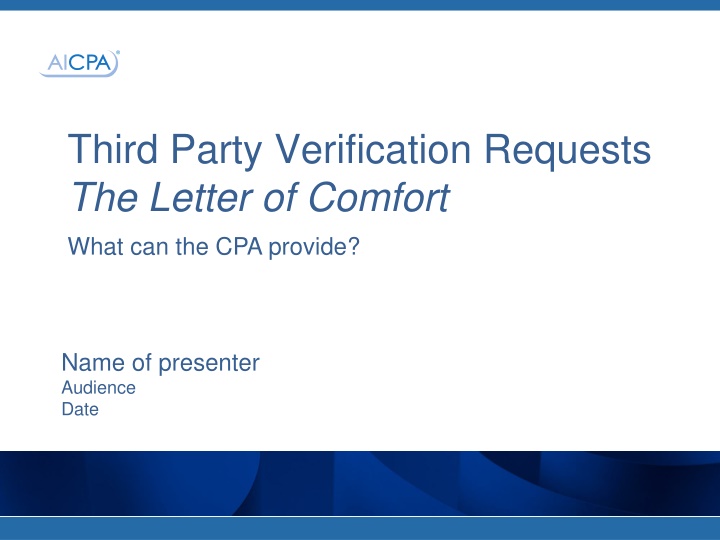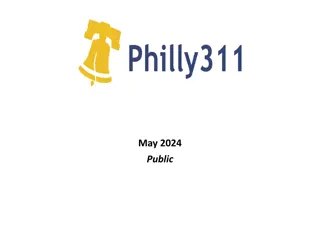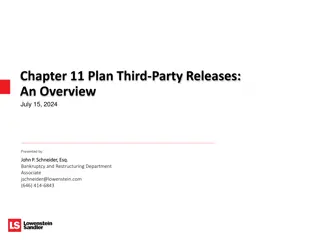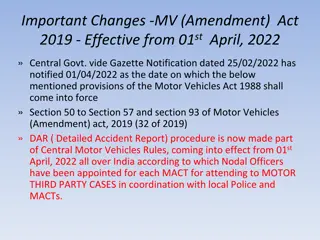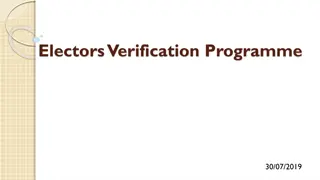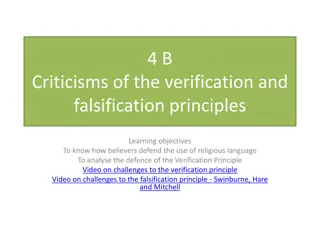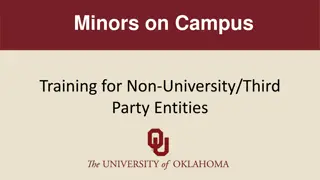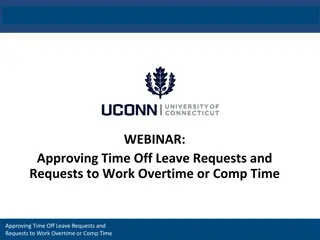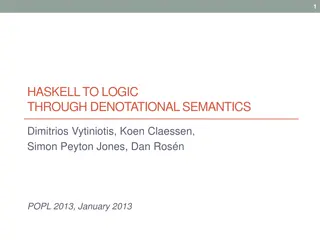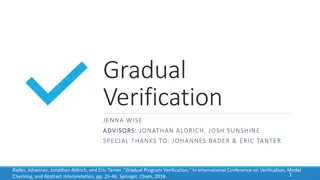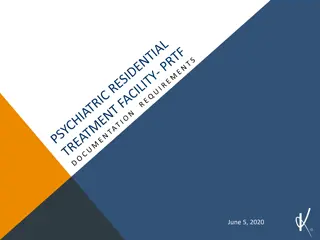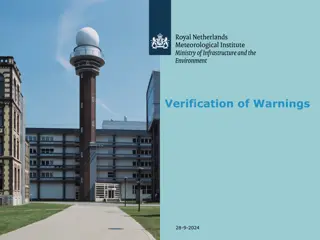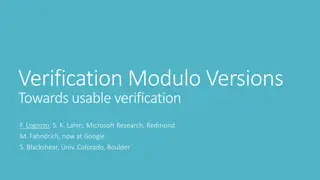Third Party Verification Requests - What CPAs Can Provide
The letter of comfort is a crucial tool for CPAs in responding to common verification requests related to borrower information and financial statements. CPAs are often asked to validate specific information by providing confirmation letters or verification statements. As the demand for funding increases, CPAs play a vital role in ensuring the accuracy and reliability of financial information for individuals and businesses.
Download Presentation

Please find below an Image/Link to download the presentation.
The content on the website is provided AS IS for your information and personal use only. It may not be sold, licensed, or shared on other websites without obtaining consent from the author.If you encounter any issues during the download, it is possible that the publisher has removed the file from their server.
You are allowed to download the files provided on this website for personal or commercial use, subject to the condition that they are used lawfully. All files are the property of their respective owners.
The content on the website is provided AS IS for your information and personal use only. It may not be sold, licensed, or shared on other websites without obtaining consent from the author.
E N D
Presentation Transcript
Third Party Verification Requests The Letter of Comfort What can the CPA provide? Name of presenter Audience Date
Todays Agenda Overview Common Verification Requests Responding to Requests What can the CPA provide? What can t the CPA provide? Professional Services/ Additional Procedures Advisory/ consulting services Agreed-Upon Procedures Attest engagements and Levels of Assurance FAQs Summary Questions? 2
Overview 3
Seeing an Increase in Requests Not a new issue For banks Continued tightening of credit underwriting standards For individual and businesses As economy improves more individuals and business owners are seeking funding Increase in diversity of: Purpose Nature Scope Intent Small business owners are impacted the most
Common Verification Requests 5
Examples of Borrower Information Requested Confirmation of a client s self-employment status Verification of income from self-employment Verification of a borrower s business ownership percentage Profitability or sustainability of a self-employed client s business The impact on a self-employed client s business if money is withdrawn to fund the down payment on a real estate purchase Validation of certain information presented on a tax return 6
CPAs Asked to Validate Information By Providing: A confirmation letter containing specific language A verification statement validating certain information presented on the tax return Certain information on a form 7
What Can the CPA Provide? 9
Factual Information Professional services that comprise additional procedures What can the CPA provide? Factual information the CPA has obtained (with signed written client consent). Additional procedures performed ranging from: rigorous examinations that result in reports about whether the CPA believes the information to be free of material misstatement, to those less rigorous procedures, resulting in lower levels of assurance. Examples Copy of income tax return CPAs written acknowledgment of tax return preparation o No assurance to the validity of the information provided by the client Copy of articles of incorporation Copy of articles of organization Financial projections o No assurance to sustainability Compilation, Review or Audit of personal financial statements Examination, or a Compilation of prospective personal financial statements An agreed upon procedures report o No assurance on matters related to solvency Time/Cost Lowest amount of work generally quick turnaround; Low cost Involves more work/time; more costly
What Cant the CPA Provide? 11
CPAs Cannot Provide Assurance on matters relating to SOLVENCY Confidential client information without client approval Client tax information without signed, written consent in IRS-specified format Certification or validation to a third party about information reported on a tax return without performing additional procedures. ALERT: For a CPA to validate information reported on a tax return without performing additional procedures would constitute a violation of professional standards, resulting in licensure implications for the CPA
Professional Services/ Additional Procedures 13
Understanding Lender Needs What level of assurance is really needed: Factual information OR CPA validation or certification of information (often requiring additional procedures performed by the CPA) If additional procedures are necessary, take into consideration: The associated time and Additional costs to the borrower Professional services that comprise additional procedures include: Advisory/consulting services Agreed-Upon Procedures Attest engagements 14
Advisory/ Consulting Services CPAs can provide factual information (with client consent) CPAs use professional judgment to obtain the necessary factual information as long as they aren t verifying or validating information without performing necessary additional procedures CPAs can prepare financial projections For requests asking pending loan s impact on borrowers self- employed business CPAs cannot provide assurance to a client s ability to repay the loan 15
Agreed-Upon Procedures Engagement CPAs can prepare a report of findings based on specific procedures performed on specified subject matter This subject matter and related procedures must be clearly defined and relatively limited in scope Subject matter may take many different forms and may be as of a specified date or over a specified period CPA does not provide an opinion or negative assurance 16
Attest Engagements: The Compilation Most basic level of service CPA assists management in presenting financial information Does not contemplate performing inquiry, analytical procedures, or other procedures No assurance that there are no material modifications that should be made to the financial statements The report states that no assurance is provided 17
Attest Engagements: The Review Involves primarily analytical procedures and inquiries that will provide a reasonable basis for obtaining limited assurance A review does not assess internal control, fraud risk A review does not test accounting records or other procedures The report provides a statement that the accountant is not aware of any material modifications that should be made to the financial statements 18
Attest Engagements: The Audit Auditor is required to obtain an understanding of the entity s internal control and assess fraud risk Obtain audit evidence Inquiry, physical inspection, observation, third party confirmations, examination, analytical and other procedures The auditor s report provides an opinion as to whether the financial statements present fairly, in all material respects, the Company s financial position, results of operations and cash flows 19
FAQs 20
Self-Employment Question: Can the CPA confirm a borrower s income from self-employment or self-employment status? Response: The CPA can only provide factual information, such as copies of tax returns (with signed written consents from the client) The CPA can provide a letter verifying they prepared the tax return based on information the client provided - This letter can be provided along with tax return copies The CPA cannot verify or validate the information reported on a tax return without performing additional procedures 21
Financial Projection of Business Income Question: Can a CPA provide a requestor with a financial projection of business income over a specified period? Response: A CPA can perform a financial forecast for a client and report their findings (with client consent). A CPA cannotattest to the sustainability of the client s business as a result of that forecasted projection (that would be expressing an opinion on a client s solvency). 22
Knowledge of Information Requested Question: Can a CPA just respond to a request if he has knowledge of the information requested? Response: Yes A CPA can respond to a form letter or email provided that the information is: - Factual information - Not expressing an opinion unless attestation performed - Not providing an attestation on solvency 23
Summary 24
In Conclusion Credit decisions are based on a lender s exercise of due diligence This includes considering multiple factors and information The burden of determining the impact on the ability of the business to continue operating as a result of the withdrawal is solely on the lender or broker A CPA cannot provide assurance on any matter related to a client s ability to repay the loan Options are available to meet lender/borrower s needs Working as a team, the lender, the CPA and the borrower can determine how to best meet everyone s needs 25
Questions? 26
